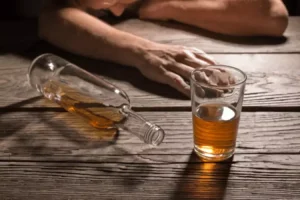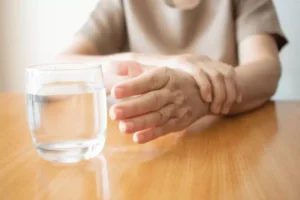
Keep on hand a listing of resources and referrals, and help older clients access and engage in these services. Unfortunately, chronic pain can also increase older adults’ risks of developing substance misuse issues. As they age, people may experience more aches and pains and seek out medications – both prescription and over-the-counter – to relieve their discomfort. Up to a quarter of all prescription drugs in the U.S. are used by older adults, and this increased exposure to drugs increases the risk of addiction or other negative consequences.
- How to make sense of media reports that suggest light or moderate drinking is healthy.
- With the approaching demographic change, we will witness an unprecedented increase in the number of aging Americans with mental health and substance use disorders over the coming decades.
- Comprehensive assessment for SUDs is a multistep process that will help you determine whether substance misuse is truly present and differentiate SUDs from possible co-occurring disorders (CODs), physical conditions common in older populations, and signs of normal aging.
- The first section of Chapter 7 describes the importance of social support in promoting and maintaining health, wellness, and recovery among older adults who misuse substances.
- The TIP is divided into chapters to make the material more accessible according to the reader’s interests.
- Treatment often includes age-specific addiction support groups that allow seniors to motivate their peers and receive support from other individuals struggling with similar disorders and hardships.
- Helping them build coping skills to meet the challenges of recovery from substance misuse.
TIP 35: Enhancing Motivation for Change in Substance Use Disorder Treatment
Other times it can be more severe and require professional help such as inpatient treatment or medication to recover. Early recognition and treatment are some of the best ways to help https://ecosoberhouse.com/ anyone struggling with substance abuse issues. Following the residential program, patients can utilize what they’ve learned to continue their recovery through our outpatient substance abuse treatment centers. It’s often helpful for those with substance use disorders to converse and connect with people that are in the same stage of life. Young adults often have shared experiences and goals, which allow them to make more meaningful connections with each other. For example, chances are two people in their early 20s will have more shared experiences, commonalities, and struggles than a 20-year-old and a 50-year-old, even if they share the same substance use disorder.

Residential Services
Older adults with SUDs respond well to treatments, if these programs are specifically designed to meet the needs of the older adult population. However, additional studies are needed because there is a dearth of evidence regarding pharmacotherapy for SUDs among older adults. At present, SUD treatment for older adults is based on clinical experience and on studies conducted in younger populations, as most clinical trials for SUD tend to exclude older adults (Blanco et al., 2008; Blanco et al., 2015; Okuda et al., 2010). An important future direction will be to expand the evidence-base for the treatment of older adults. This could include new clinical trials with less restrictive inclusion criteria, use of electronic medical records and observational studies, and simulations, as well as a combination of all these approaches (Blanco et al., 2017). SUD can be difficult to recognize in older adults and lead to treatment delays due to medical comorbidity, neurocognitive impairment, and functional decline (Seim et al., 2020).

Chapter 6: Substance Misuse and Cognitive Impairment
When patients abuse their drugs – either intentionally or accidentally, it increases their risk of developing addictions. Family members and physicians need to educate seniors on proper medication usage and side effects so they can avoid any potential misuse down the line. On the other hand, having strong social connections can improve mental health and reduce the risk of substance use disorders. Studies have found that increased social interaction among seniors has been linked with positive outcomes such as improved cognitive functioning and lower rates of depression and anxiety.
Three key elements of preventive care for older adults in recovery from substance misuse are nutrition, exercise, and fall prevention. You don’t need to be an expert in nutrition or fitness to provide older adults with accurate information about health. Just knowing a few things about these elements of wellness for older adults can help you get the conversation started. Many communities have befriending programs that send “friendly visitors”—who are trained volunteers—to the homes of older adults who have no close ties to neighbors or nearby relatives, or who are homebound.
How do we improve older adult mental health care in the post COVID-19 era?

This manual serves as a quick reference guide for clinicians treating chronic pain in adults living with a history of substance use. It covers patient assessment and treatment, and provides an algorithm for managing chronic pain, as well as a summary of non-opioid analgesics. This manual provides clinical practice guidelines for using medications in the medication-assisted treatment of alcohol use disorder. It offers guidance on prescribing acamprosate, disulfiram, oral naltrexone, and extended-release injectable naltrexone. This updated (March 2020) TIP is intended to provide addiction counselors and other providers, supervisors, and administrators with the latest science in the screening, assessment, diagnosis, and management of co-occurring disorders (CODs). This updated TIP includes the latest evidence on motivation-enhancing approaches and strategies.
- Furthermore, problems with thinking may make it harder for some older adults to remember how to take prescription medication appropriately or keep track of their alcohol consumption to ensure it does not exceed recommended guidelines.
- One of the primary reasons older people struggle with substance use disorders is a decrease in family support and social interaction as they age.
- Most providers and professionals do not have specialized training in geriatric substance misuse, and most family members and caregivers do not know how to recognize and respond to these problems in older adults.
- I really failed this time.” The provider helps her reevaluate her perspective about what it means to have a chronic illness and how to manage it, using her experience in recovery as an analogy.
Social Support: The Key to Health, Wellness, and Recovery
Older adults also might prefer in-person visits, as suggested in a qualitative study of older adults in treatment for AUD during COVID-19, where they considered face-to-face provision to be essential 80. As the popularity of telehealth continues to increase, it will be of utmost importance to address the structural barriers for accessing telehealth treatment for older adults and to adapt such services to increase engagement in older people, their what is the best treatment for substance abuse for older adults caregivers, and healthcare providers. The high prevalence of isolation in older adults who misuse substances can negatively affect cognitive functioning and reduce well-being. Older adults who lack family ties or social networks may find maintaining recovery from substance misuse difficult. Healthcare, behavioral health service, and social service providers can help older adults who misuse substances reduce isolation and improve recovery outcomes by promoting broader social networks.
- This is why we offer women-specific programming, to create a welcoming, truly safe feeling space for all at West Oaks.
- This also applies to recovery; by continuing to engage in recovery activities, use relapse prevention techniques, and rely on social supports, older clients can strengthen their resilience and maintain a sense of control over their recovery.
- Sometimes, people notice but ignore it, thinking it’s best for older people to keep doing what makes them happy.
- The benefits of early detection and treatment of SUDs can have dramatic implications for overall physical and mental wellbeing in older adults.
Chapter 1: Older Adults and Substance Misuse: Understanding the Issue
Older adults in recovery from substance misuse who are widows or widowers may feel guilty about surviving and lose interest in life. The following scenario focuses on exploring an older adult’s strengths to rekindle a sense of possibility about the future. SUDs are moderately to highly heritable; findings indicate that an individual’s risk would be proportional to the degree of genetic relationship to the relative with SUDs.





